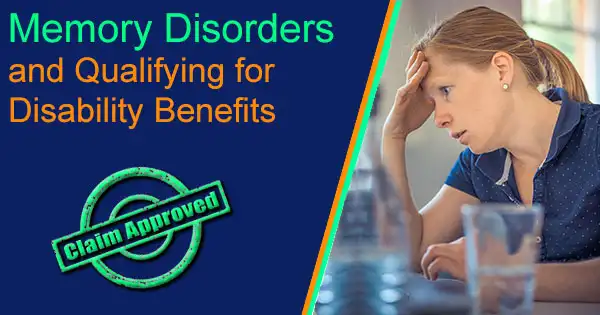Memory Disorders and Qualifying for Disability Benefits
Can I get disability benefits if I am suffering from the effects of Memory Disorders?
Author: Attorney Lloyd Bemis
Updated 1/19/2024
The Social Security Administration acknowledges memory impairment as a disability under Section 12.02 Neurocognitive Disorders of its Blue Book. Memory loss is evaluated by its severity and the extent to which it limits a claimant’s ability to work.

The SSA recognizes Memory Disorders in its Blue Book under Section 12.02. To qualify for Social Security Disability benefits a person must meet the requirements of the listing or prove that they are unable to work.
As people age it is not uncommon to experience some memory loss.
A person might forget a name temporarily or misplace their keys. This forgetfulness is quite normal and doesn’t interfere with an individual’s ability to work or live a full life. A memory disorder is much more serious, however, and can prevent a person from working and impact their personal life, possibly qualifying for disability assistance.
Memory is the ability to store, retain, and recall information and past experiences; it can be categorized as short-term memory or long-term memory.
Short-term memory is the ability to remember and process information at the same time and remember that information for a short period. Long-term memory is the storage of information and experiences over an extended period of time. Memory disorders can range from mild to severe and be progressive or sudden, but all result from some type of neurological damage to the brain, hindering the retention and recollection of memories.
An individual experiencing a memory impairment will usually exhibit some of the following symptoms:
- Frequently forgetting words while speaking
- Confusing words; for example, saying “chair” for “table”
- Asking the same question over and over
- Misplacing items or putting them in inappropriate places
- Taking a long period of time to complete familiar tasks
- Getting lost in a familiar place
- Changes in mood for no reason
These symptoms can cause you to miss work and jeopardize your ability to maintain employment.
Memory impairment is common in neurological diseases such as Parkinson’s disease, Alzheimer’s disease, and dementia, but also occurs in other disorders.
- Amnesia – a mental condition that affects memory and learning in an otherwise normally functioning individual.
- Agnosia – the inability to recognize certain objects, persons, or sounds.
- Hyperthymestic syndrome – a rare disease in which individuals can recall events from every day of their lives except those memories before age five or days that were uneventful.
- Wernicke-Korsakoff syndrome – a neurological disorder caused by a thiamine deficiency often associated with alcohol abuse.
Like many other medical conditions, treatment for memory loss depends on the cause.
For example, memory loss caused by medications may be resolved with a change in prescription; nutritional supplements can be added to a patient’s diet to correct a vitamin deficiency. In other cases, therapy might help a patient who has suffered a stroke re-learn how to tie their shoes.
You will need to demonstrate that you are following your doctor’s treatment plan, and despite that your medical condition still prevents you from working full-time.
Memory Disorders and Qualifying for Disability Benefits.
But memory loss is not always easy to treat, affecting not only an individual’s ability to remember, but also their capacity to reason, make decisions and communicate.
Frequently claimed as a primary or secondary impairment, the Social Security Administration acknowledges memory impairment as a disability under Section 12.02 Neurocognitive Disorders of its Blue Book. Memory loss is evaluated by its severity and the extent to which it limits a claimant’s ability to work. In order to qualify for disability benefits, you must prove you have a physical or mental condition that causes memory loss and prevents you from performing required tasks at work. Additionally, and perhaps even more important, your memory impairment must limit your ability to learn new skills to perform another job. If you are not able to remember locations, work procedures, and short instructions, it’s likely Social Security will approve your application.
An applicant must show a decline in one of the following cognitive areas:
- Paying attention and listening
- Planning and judgment (executive function)
- Learning and memory, particularly recent memory
- Ability to remember words and not mix up words
- Physical coordination
- Social cognition – knowing how to behave in a variety of circumstances
In addition to one of the above, the applicant must provide evidence of extreme limitation of one, or marked limitation of two of the following skills. “Marked” means less than extreme and worse than moderate.
- Understanding, remembering, and applying information
- Interacting with others
- Concentration; the ability to maintain pace and complete a task
- Adapting or managing oneself; the ability to work independently of others, be aware of safety hazards and take precautions
Social Security will want to see complete medical records and your work history.
You should document all sources of medical treatment including names of physicians and addresses. Your doctor and medical providers should provide detailed statements demonstrating your inability to perform repetitive tasks involving short-term and long-term memory. Your doctor should also provide a statement describing your specific symptoms and how your memory is affected.
Social Security will probably require a consultative exam performed by a Social Security doctor to evaluate claims of symptoms that are not apparent.
This exam will include a Weschler Memory Scale (WMS) exam which tests memory functions such as the ability to recall past events, current events, number sequences, photos, pictures and word associations. If you have trouble remembering appointments, ask a friend or family member to write down dates and times. If you miss a meeting with Social Security, your claim could be dismissed.
If you have a memory disorder, yet your disability does not match the specifications of Social Security’s listing, you may still be eligible for Social Security Disability benefits if you have another impairment.
For example, your memory impairment is judged to be only moderate, but you also experience depression.

Applicants often have more than one illness or injury that prevents them from working full time.
By itself one disorder may not meet the requirements of an impairment as stated in Social Security’s Blue Book. However, if an applicant has multiple medical conditions, Social Security must consider how those health issues, combined together, limit an applicant’s ability to hold a job and perform necessary daily tasks. Social Security will also evaluate how your limitations affect your ability to work (called a medical-vocational assessment), taking into account whether or not you are able to drive, your age, and level of education.
Once Social Security determines the limitations caused by your condition, they will employ a vocational expert to assess whether a person with these limitations is employable.
Most vocational experts will find a person to be unemployable if their condition or the treatment rendered for the condition causes the person to regularly be absent two or more days a month or be “off-task” 15% or more of the workday.
If you are 55 or older or have another medical condition you may get approval.
Social Security follows a set of rules to determine when the agency expects an applicant to learn a new job.
Applicants who are 55 or older often fall under a grid rule, which means they are not expected to learn a new job. For example, a 55-year-old applicant with no transferable skills might be found disabled. If you can’t go back to your old job, and you don’t have the skills to learn a new one, Social Security will likely grant you disability benefits.
Social Security also has basic financial requirements.
Before you are eligible for Social Security disability benefits, you must satisfy some basic financial requirements.
You must: 1) have a disability that has lasted or is expected to last 12 months; and 2) you must have worked in a job where you paid Social Security taxes long enough and recently enough; and 3) you must not earn more than Substantial Gainful Activity (SGA), which is $1,550 per month in 2024 for nonblind applicants and $2,590 per month for blind applicants.
What if I don’t qualify for SSDI?
If you haven’t worked long enough to earn enough work credits, or if you earn too much income, you may be eligible for disability benefits through another Social Security program, such as Supplemental Security Income (SSI), or from a long-term disability insurance plan through your employer or a privately purchased policy.
SSI is a program that pays monthly benefits to people with limited income and resources who are disabled, blind, or age 65 or older. SSI is based on income instead of work credits, and is financed by general funds of the U.S. Treasury.
I have long-term disability insurance – should I file a claim?
Yes, you should file a claim as soon as you become disabled.
Long-term disability insurance (LTD) is coverage that protects your income if you are unable to work due to illness or injury and is purchased as part of a group employment plan or privately through an insurance company. Policies pay between 50-60% of your salary and benefits continue until you return to work or for the number of years stated in the policy. However, LTD coverage is good only as long as you are employed, so do not quit your job before you file a claim, and be sure to check your policy’s definition of “disabled” as each policy will state the definition of “disabled” which is in use. Additionally, be aware that long-term disability insurance companies can require a claimant to also apply for SSDI.
How do I file for Social Security Disability benefits?
You can apply for Social Security Disability benefits online, over the phone, or in person at your local Social Security Administration office.
If your initial application is denied, don’t be discouraged. Approximately 65% of initial applications are denied, but you will have the opportunity to appeal.
There are four steps to the Social Security appeal process:
- File a Request for Reconsideration with the Social Security Administration to completely review the case.
- If you don’t agree with SSA’s response to your Request for Reconsideration, you can request a hearing before an Administrative Law Judge (ALJ). ALJs are attorneys who work for the Social Security Administration; they review SSDI cases and either uphold or overturn decisions to deny SSDI benefits. If you are not represented by an attorney at this point, now is the time to obtain legal counsel. This is a critical point in the process and will raise your chance for success.
- If an ALJ does not grant your claim, you can request that the Appeals Council review your case.
- Federal Court review. The final step in the appeal process is filing suit in U.S. District Court.
Do I need a disability attorney for SSDI?
Qualifying for Social Security Disability benefits is problematic because the requirements of Social Security’s impairment listing are very difficult to decipher.
Your chances for approval are increased significantly if you have an experienced disability attorney who can gather your necessary medical evidence and even write a brief explaining why you qualify. At each potential stage of the process, from the initial application stage, the reconsideration stage and the ALJ hearing stage, an attorney can assist you in completing the detailed forms and questionnaires required by Social Security, collecting and submitting relevant medical evidence, and preparing questionnaires for your doctors. At the ALJ hearing phase an attorney will not only continue to assure that the evidence is complete, but prepare you for questioning by the ALJ, prepare an argument on your behalf and question any doctors or vocational experts selected by the ALJ to testify at the hearing. At the Appeals Council and federal court level, a lawyer can present legal arguments to show your case was wrongfully denied. Fees charged by disability attorneys are regulated by federal law and are usually 25% of disability backpay you are owed. There are no out-of-pocket costs, and if you don’t win your case, you won’t be charged anything.
Do I need a disability attorney for a long-term disability insurance claim?
Whether you have a long-term disability insurance policy purchased through a private insurance broker or a group policy purchased with your employer, filing a claim for long-term insurance is a complex process.
The wording of LTD policies can be confusing and the laws and regulations which affect the two types of LTD insurance differ in their procedures for filing claims and appeals. An experienced LTD attorney with thorough knowledge of ERISA laws and regulations will avoid mistakes and increase your chance of success. An attorney will act on your behalf, completing your application and filing your claim in a timely manner. They can also negotiate a settlement or file an appeal for you. If it becomes necessary to file suit, an LTD attorney can prepare your case against an insurer. Most LTD attorneys handle cases on a contingency basis and charge approximately 25%-40% of a claimant’s past due benefits. You do not pay an attorney’s fee unless the attorney wins your case.
If you are suffering from memory loss and have been denied disability don’t give up, almost 70% are denied initially! Just call 512-454-4000 for a free, no obligation consultation to learn what your options are. Have some questions? just give us a call, we love to help folks just like you!
Disability benefits are an important source of income for those who are unable to work. If you are not able to work due to accident or illness, you may be eligible for Social Security Disability or Long Term Disability benefits. If you have applied for benefits and been denied, contact the attorneys at Bemis, Roach and Reed for a free consultation. Call 512-454-4000 and get help NOW.
Neurocognitive Disorder and obtaining Social Security disability benefits
Brain Aneurysms and Qualifying for Social Security Disability Benefits
Cerebral Atrophy and filing a Disability Claim


![]()
Your Free Initial Consultation
Call now:
At Bemis, Roach and Reed, if we can't help you, we will try to find the right attorneys for you.
We offer each of our prospective clients a free no obligation one hour phone or office consultation to see if we can help you and if you are comfortable with us. We know how difficult a time like this can be and how hard the decisions are. If we can be of assistance to you and help you find a solution to your issue we will even if that means referring you to another attorney.
Let's get you Started:
If you could provide us with some basic information about your claim we will get right back with you with a free case evaluation and schedule your Free Consultation Today.






